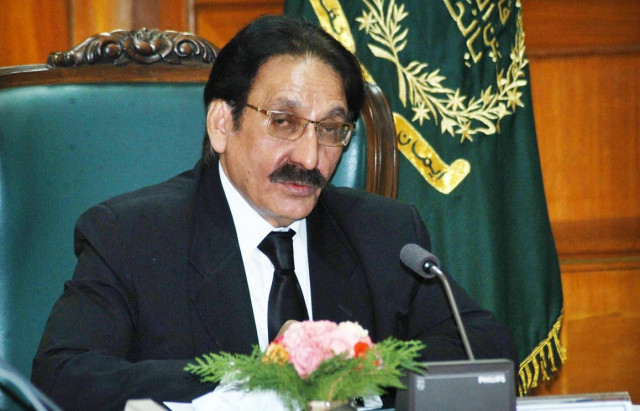Judiciary performing functions strictly within constitutional domain: CJ
Reformist judge Justice Mian Shakirullah Jan retires.

In an apparent move to silence critics, the chief justice on Thursday asserted that the judiciary was performing functions purely within its constitutional domain.
“Being the defender of supremacy of the Constitution and rule of law, the judiciary stands at the highest pedestal in any democratic setup in the world,” said Chief Justice Iftikhar Muhammad Chaudhry, addressing a gathering held to bid farewell to senior outgoing apex court judge Justice Mian Shakirullah Jan.
He said that an impartial, independent and accountable judicial sector was crucial for the protection of basic human rights, fair resolution of disputes and the sustainable economic and political development.
“Judiciary today is the greatest unified and integrating force of this country and is fully conversant of its basic duty to protect the rights of citizens as well as institutions against constitutional excesses,” stated the chief justice.
He maintained that the role of the superior courts in all modern democracies was crucial for protecting human rights, countering terrorism, curbing violence and checking corruption and ensuring good governance.
“Worldwide, the judgments of the superior courts are followed and implemented by the subordinate courts and state institutions for defending citizens’ rights rather than protecting government’s interests,” he said — hinting towards government’s refusal to write a letter to Swiss authorities regarding graft cases against President Asif Ali Zardari.
Before ending his speech, he said: “I am hopeful that all the state institutions and civil society will join hands for achieving the common goal of transforming Pakistan into a true welfare state by following the principles of rule of law, fairness, accountability, transparency and constitutional supremacy”.
Justice Jan retires
A reformist to the core, Justice Mian Shakirullah, the senior-most judge of the apex court after the chief justice himself retired on Thursday.
He was elevated as an Additional Judge of Peshawar High Court on December 13, 1993, and then confirmed as judge of the high court in 1995. He was then appointed as Chief Justice of Peshawar High Court, taking oath on 10th January, 2002.
Being chief justice, he initiated and introduced various reforms for the improvement of the provincial judiciary in terms of reducing delays, which included the creation of 107 new Courts.
Justice Jan was elevated as a Judge of the Supreme Court on July 31, 2004. He is among those judges who had refused to take oath under the Provisional Constitution Order (PCO) of November 3, 2007, sponsored by former military dictator General Pervez Musharraf.
Justice Jan also served as acting chief election commissioner and his last tenure was from March 3, 2012, to July 22, 2012. During this period, he was part of the historic push to finalise credible computerised electoral rolls and brought many reforms in a historically toothless and stagnant body in light of the observations made by the Supreme Court.
Published in The Express Tribune, August 17th, 2012.












1724319076-0/Untitled-design-(5)1724319076-0-208x130.webp)






COMMENTS
Comments are moderated and generally will be posted if they are on-topic and not abusive.
For more information, please see our Comments FAQ